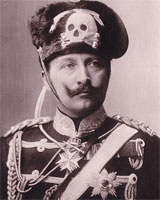The name Benedict means "blessed," and it was a blessing indeed that so many of the pontiffs passed away quickly because it slowed the Muslim juggernaut. The 11th century opened with a famous battle fought outside Dublin between the Christian Irish and the berserk Vikings.
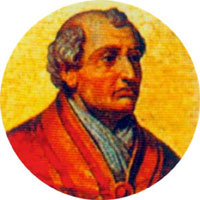 Pope Benedict VIII. Pope from 1012 to 1024. |
|
 King Brian Boru (941–1014) was killed at the Battle of Clontarf. |
The great high king of Ireland was slain, with horrendous casualtes on both sides; but the Christian Irish won the battle and ejected the Vikings. Later, those same Vikings morphed into Normans, and they invaded again under King Henry II in October 1171. Amazingly, Pope Alexander II canonized one of the beserkers as "Saint Olaf."
Benedict was opposed by an "Antipope" named Gregory VI. The future emperor Henry restored him to the Chair of St. Peter, and in return, he crowned him fake "Roman Emperor."
Another highlight of his pontificate was the visit of Æthelnoth, Archbishop of Canterbury, to obtain the pallium. His visit laid the groundwork for the Babylonian Captivity of Britannia in 1066.
The next Pope, Benedict IX, was the "nephew" of Pope John XIX, which means that he was his son!
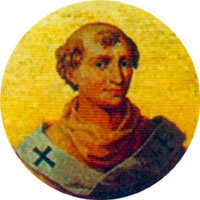 Pope Benedict IX. Pope on 3 different occasions between 1032 and 1048. |
|
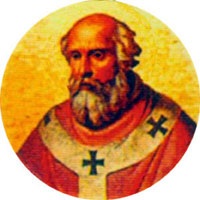 Pope Leo IX (1002–1254). Pope from 1049 to 1054. |
The nightmarish reigns of Pope Benedict IX came to an end with Pope Leo IX in 1049. In 1054, Pope Leo IX instigated the Great Schism, which permanently separated Roma from Constantinople.
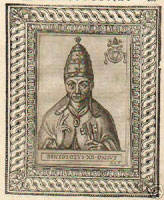 Pope Benedict X. Pope from April 1058 to Jan. 1059. |
|
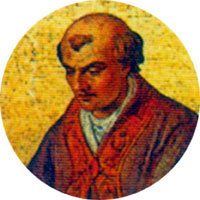 Pope Nicholas II. Pope from 1059 to 1061. |
Benedict was deposed in 1059, but, unusual for that time, he was not immediately sent to St. Peter. He languished in prison until he went to meet his Maker sometime between 1073 and 1080. He was succeeded by Pope Nicholas II—who was definitely not a Santa Claus.
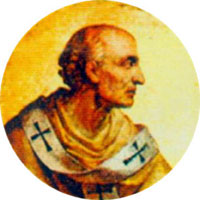 Pope Benedict XI. Pope from 1303 to 1304. |
|
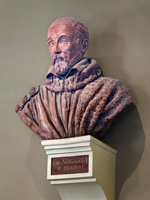 Guillaume de Nogaret (1260–1313). |
On Friday, October 13, 1307—a very, very "lucky day" for France, King Philip secretly arrested all the Templars. They were guilty of all kinds of abominable crimes. The worst was worshipping Moloch. Moloch or Muhammed is the Arabic name for Apollyon.
In 1313, Guillaume de Nogaret—councilor to King Philip IV—was assassinated by poisoning.
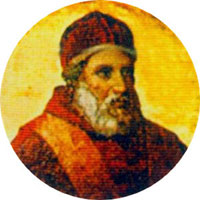 Pope Benedict XII (1285–1342). Pope from 1334 to 1342. |
|
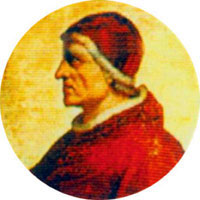 Pope Clement VI (1291–1352). Pope from 1342 to 1352. |
During the Papacy of Clement VI, the Grim Reaper was furiously swinging his scythe over Western Europe. The Black Death which followed reduced the population by 50 million souls, and opened the door for the invasion of the Terrible Turks.
After the end of the deadly Thirty Years' War (1618–1648) the power of the fake "Holy Roman Empire" began to decline, and France became the most powerful nation in Europe. French New world colonies included Canada and Louisiana.
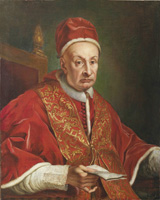 Pope Benedict XIII (1649–1730). Pope from 1724 to 1730. |
|
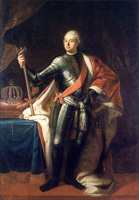 Prussian Friedrich Wilhelm (1688–1740). Ruled from 1713 to 1740. |
Friedrich Wilhelm hated the French was a passion and he passed along that hatred to his son—the great British spy Friedrich. Friedrich was the instigator of the Seven Years' War which was a disaster for France.
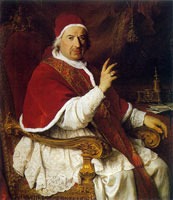 Pope Benedict XIV (1675–1758). Pope from 1740 to 1758. |
|
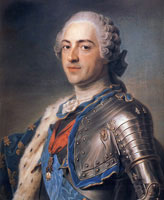 King Louis XV (1710–1774). Reigned from 1715 to 1774. |
The American and French Revolutions followed the suppression of the Jesuits. It was no coincidence that the guillotine as a method of killing was used in France because the "Holy" Koran says to BEHEAD those who don't believe in Allah and the Last Day (Sura 7:14).
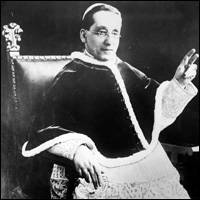 Pope Benedict XV (1854–1922). Pope from 1914 to 1922. |
|
Field Marshall Helmuth von Moltke was fearful of the prospect of Russian troops entering Berlin while he entered Paris. As a result, he lost his nerve, and moved as many as 275,000 soldiers back to East Prussia. Here is an account of that history-changing event from "Kaiser Bill's" cousin Winston Churchill:
And at that culminating moment the Russian pressure began to produce substantial effects. Honour must ever be done to the Tsar and Russian nation for the noble ardour and loyalty with which they hurled themselves into the war. A purely Russian treatment of their military problem would have led the Russian armies into immediate withdrawal from their frontiers until the whole of their vast mobilization was completed. Instead of this, they added to a forward mobilization an impetuous advance not only against Austria but against Germany. The flower of the Russian Army was soon to be cut down in enormous battles in East Prussia. But the results of their invasion were gathered at the decisive point. The nerve of the German Headquarters failed. On August 25 two army corps and cavalry of the German right were withdrawn from France. On August 31 Lord Kitchener was able to telegraph to Sir John French "Thirty-two trains of German troops were yesterday reported moving from the western field to meet the Russians." (Churchill, The World Crisis 1911–1918, p. 147).
That withdrawal of troops from France caused "Dead Head" to fire von Moltke a few months later.
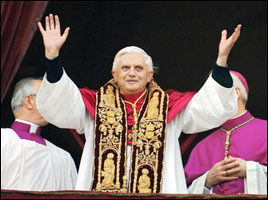 Instead of Pope Benedict XVI, the man on the balcony was supposed to be Pope Gregory XVII. . |
|
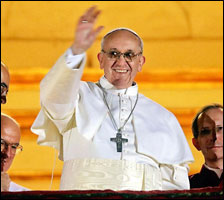 Pope at last, March 13, 2013. |
Pope Benedict XVI is the last Pope named Benedict in the nightmarish 10-horned, 10-toed Papal dynasty! The best way to rescue Catholics . . . and Muslims . . . from the Babylonian system is to present the true history of the Papal dynasty:
Flee out of the midst of Babylon, and deliver every man his soul: be not cut off in her iniquity, for it is the time of JEHOVAH's vengeance; he will render unto her a recompense (Jeremiah 51:6).
And I heard another voice from heaven saying, "Come out of her, my people, that ye be not partakers of her sins, and that ye receive not of her plagues" (Apocalypse 18:4).
Vital links
References
Churchill, Winston S. The World Crisis 1911–1919. (Abridged version, originally 5-volumes).Charles Scribner's Sons, New York, 1929.
Norwich, John Julius. Absolute Monarchs: A History of the Papacy. Random House, New York, 2011.
